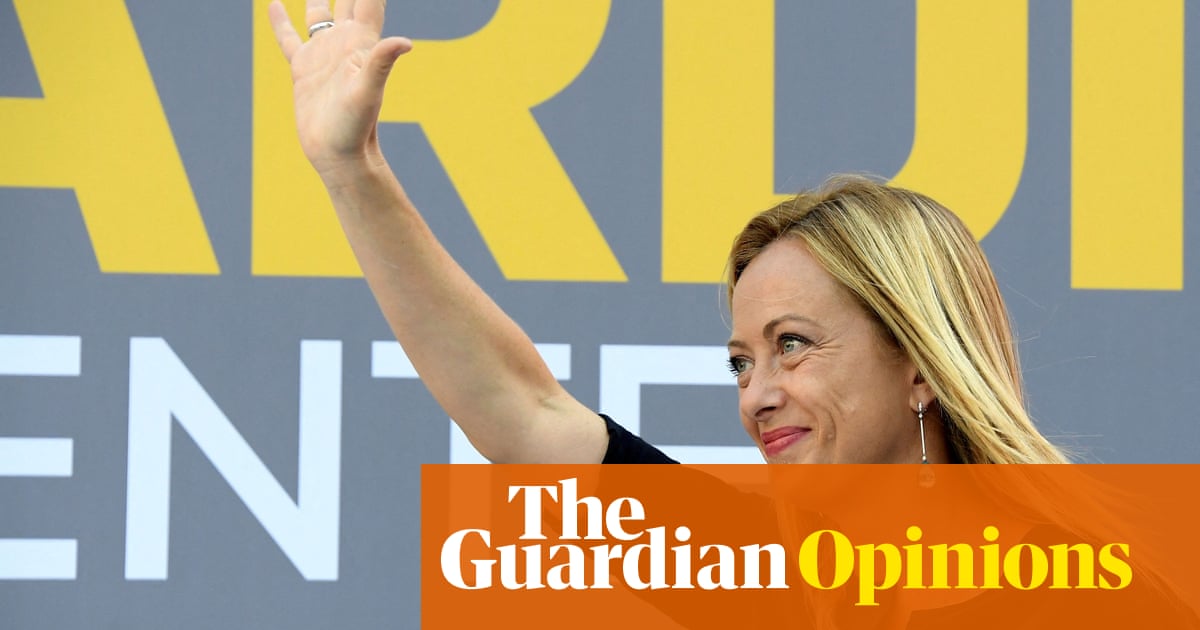
Show caption ‘Certain elements of Giorgia Meloni’s party retain a cultural “nostalgia” for Italy’s fascist traditions.’ Photograph: Reuters Opinion The Guardian view on Giorgia Meloni: repositioning Europe’s radical right Editorial The Brothers of Italy leader has embraced EU integration and rejected her party’s neo-fascist roots. She remains a threat to what the European project stands for Mon 15 Aug 2022 18.06 BST Share on Facebook
Share on Twitter
Share via Email
As one of the most consequential elections in Italy’s postwar history approaches, the frontrunner to become prime minister is already seeking to make an impact on the international stage. Giorgia Meloni, the leader of the nationalist Brothers of Italy party, recently released a slick video in which she embraces European integration and distances herself from her movement’s neo-fascist origins. Speaking in English, French and Spanish, she notes that the Italian right had “handed fascism over to history for decades”. She and her party, Ms Meloni asserts, belong to mainstream western conservatism – an Italian equivalent of the Conservative party and US Republicans.
Polls continue to suggest that the rightwing alliance comprising Brothers of Italy, the nationalist League and Silvio Berlusconi’s Forza Italia will triumph on 25 September, with Ms Meloni’s party in pole position. As Italy’s first female prime minister, she would become a major player in Europe’s affairs at a critical moment of crisis. So how reassured should her intended audience be by this attempt to detoxify her brand?
It is important to be clear about what Ms Meloni is not. Certain elements of her party retain a cultural “nostalgia” for Italy’s fascist traditions, but there will be no March on Rome in late September, 100 years after Benito Mussolini seized power. Italy’s democratic institutions will remain in place (although the right’s desire for a directly elected presidential system would alter constitutional checks and balances). On economics, the rightwing coalition’s election manifesto and Ms Meloni’s video suggest that her government would be relatively pragmatic, seeking to placate markets and ensure that Brussels continues to send post-Covid funds to Rome.
There is, however, no reason to be remotely sanguine about Ms Meloni’s possible accession to power. Debates about 20th-century fascism are beside the point. Ms Meloni’s desire is to become the de facto European leader of a modern radical right, one that seeks to move away from the postwar western emphasis on universal rights and protections for minorities. Speaking in June to a rally organised by Vox, the Spanish far-right party, Ms Meloni could not have been clearer about the culture wars that she would pursue as prime minister. “There is no middle ground possible,” she said. “Today, the secular left and radical Islam are menacing our roots … Either say yes, or say no. Yes to the natural family, no to the LGBT lobbies … Yes to the universality of the cross, no to Islamist violence. Yes to secure borders, no to mass immigration.”
This is the ethnocentric politics of “illiberal democracy” – drawing on white replacement theory, cultural Christianity and hatred of diversity – which has been pioneered by Viktor Orbán (a close ally) in Hungary. As the leader of a European Union founding member and the eurozone’s third-largest economy, Ms Meloni’s long game would be to tilt the EU’s values in this direction. Her trilingual endorsement of the European project is a sensible strategic move by a skilled politician apparently on the threshold of power. But no one should be in any doubt as to the threat she represents to what Europe is supposed to stand for.







